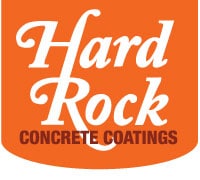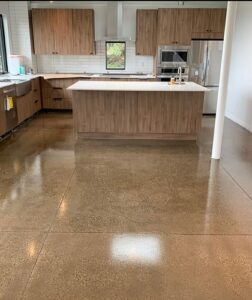In the past few years, concrete countertops have taken off. And it doesn’t look like the trend is backing down any time soon. These counters are a sure way to infuse a more rustic or industrial. But if you are thinking about concrete countertops for your kitchen or bathroom, there are a few pros and cons you need to know about.
Advantages of Concrete Countertops
A lot of homeowners are attracted to concrete countertops because of these benefits:
- Durability
Concrete is used in the foundation of homes, roads, and sidewalks. It is one of the most durable building materials available and can hold up against the daily wear and tear of a busy kitchen. With proper maintenance, you can easily expect concrete counters to last for decades. - Seamlessness
Installers can achieve a smooth, seamless surface depending on the design and size of the countertop. But even with larger concrete counters professionals can minimize the appearance of seams with color-matched seam filler. - Easy Cleaning and Maintenance
As long as concrete counters are properly installed and sealed, they can be easy to clean. All it takes is some warm, soapy water and a soft cloth. For more heavy duty cleaning don’t use harsh cleansers or abrasives. Follow the instructions provided by the contractor and use a pH balanced cleaner that doesn’t harm the sealant. And be diligent about applying the right stone sealer to the countertops every year or so, as instructed by the contractor. - Countless Styling Options
There are endless ways to customize concrete counters because it is such a versatile material. It can become any shape or texture. It can also be any color through the use of stains, dyes, and specialized coatings. Homeowners can even choose to embed fossils, tile, recycled glass, or even shotgun shells.
Disadvantages of Concrete Countertops
Along with all the pros, a few cons for concrete counters include:
- Susceptible to Stains
Concrete is a porous material. If left unsealed it is highly susceptible to stains, scratches, and harboring bacteria. You want to touch up the sealant regularly and immediately wipe up spills to prevent stains. - Not Exactly Heat Resistant
The issue lies with the sealer. Concrete is heat resistant, but the sealant used for countertops might not be. Placing a hot pan on a concrete counter may discolor or damage the sealer. When talking with a concrete contractor it is important to discuss different sealers and how well they resist heat damage. - Cracks
Hairline cracks occur in nearly all concrete countertops. And while professional installers can minimize cracks, there is no way to prevent them altogether. Though the cracks are often hardly noticeable and do not usually compromise the structural integrity of the finished product. - Cost
We aren’t just talking about money. While concrete is a readily available and less expensive material, it can be expensive to have these countertops professionally installed. And as far as the cost of time, it takes 28 days for concrete countertops to fully cure. There is also the added expense of any personalization like textures, staining, and finishes. That said, concrete countertops are still more affordable than granite, marble, and quartz.



